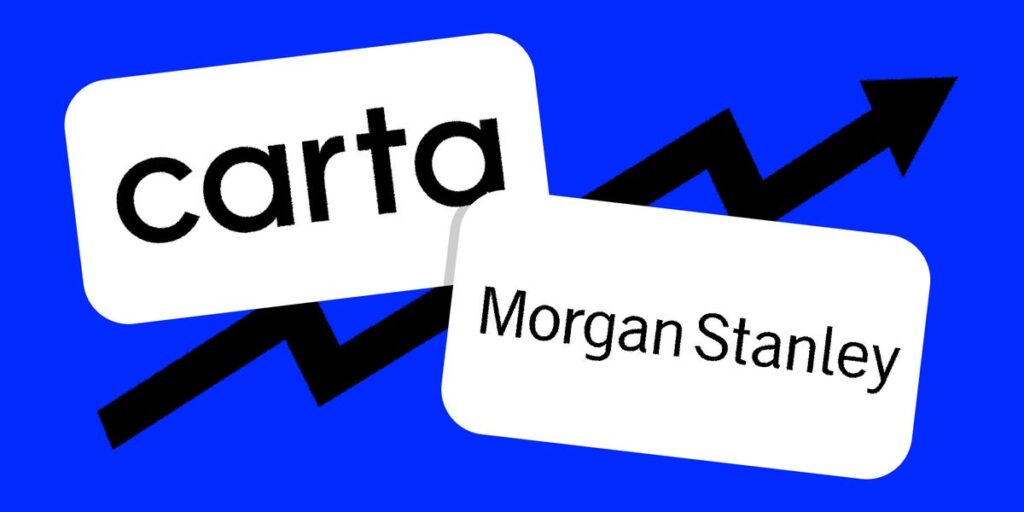- After a two-year market slowdown, IPOs are rebounding and set to surge in 2025.
- Morgan Stanley has partnered with cap-table firm Carta to reach founders before they get rich.
- Wealth head Jed Finn took BI behind the scenes of the referral deal in an exclusive interview.
After a two-year dealmaking drought, IPOs are mounting a comeback, enriching their founders and employees in the process. To land these desirable clients before their big windfall, Morgan Stanley has partnered with Carta, a platform for startups and investors to track company ownership, Business Insider has learned.
Silicon Valley firms widely use Carta’s financial software for tasks like issuing stock options and administering executive compensation. With this new partnership, Carta will refer clients looking to go public to Morgan Stanley at Work, a division that caters to businesses and their employees.
Carta told BI it has nearly 2,000 clients that have raised up to a series C and are on the pathway to IPO.
“The likelihood of the pipeline materializing is higher than it has been in a very long time,” the bank’s wealth boss, Jed Finn, said in an exclusive interview. He said investors have been waiting to cash out and favorable conditions are on the horizon, such as the future Trump administration cutting red tape for megamergers.
Morgan Stanley uses workplace services like employee financial advice and executive compensation to get clients in the door while they’re building wealth and hopefully convert them into fee-paying financial advisory customers. Over the past three years, the $6 trillion wealth business has added $250 billion in assets from individuals who started either as workplace or brokerage clients. This partnership is part of Morgan Stanley’s effort to reach $10 trillion in client assets between the wealth arm and its smaller $1.6 trillion investment management unit.
Since companies are staying private longer and growing larger before going public, their employees are more likely to need financial advice before and after a mammoth IPO, Finn said. Potential dilemmas include whether to put their shares in a trust or how to diversify their newfound wealth.
“We’re uniquely situated to be able to address that complexity and to provide the advice these employees need as the companies embark on their next wave of growth,” he said.
How it works
The referral deal fills gaps for Morgan Stanley and Carta. It gives the bank access to a broader customer base of private companies than its in-house stock planning administrator, Shareworks, and allows Carta customers to go public with less hassle. Carta stopped managing employee equity for public companies last year, but now customers can swiftly transport their data from Carta to Shareworks before they go public and stay on the platform after their IPO.
“This really works for making it easier for Carta clients to get that second part of their existence, the public part, in the hands of somebody who has the experience to deliver it,” Finn said. “It takes a lot of the risk, the stress, the data security issues out of the process because we have a seamless and protected mechanism to make that transition.”
Morgan Stanley
Carta clients can access Morgan Stanley services before moving to Shareworks. For instance, clients considering going public can meet with a Morgan Stanley investment banker to walk through options.
From there, companies can access the same offerings as other Shareworks customers, such as IPO prep and valuation services. After going public, they can tap Morgan Stanley for other services, including 401(k) management and financial reporting.
Before and after the IPO, employees can get financial advice from Morgan Stanley. Advisors even visit company campuses to hold webinars and office hours. Ideally, these conversations lead to employees becoming wealth management clients, Finn said.
It has been a rocky year for Carta
Finn had known Carta CEO Henry Ward since 2019 when the bank was looking to expand its stock management business. That year, Morgan Stanley bought a Carta competitor, Solium, now known as Shareworks. In 2021, the bank also acquired the cap table business of Silicon Valley law firm Wilson Sonsini.
The partnership caps off a tough year for Carta, which was accused in January of misusing client information to solicit startup investors to sell their shares without the client’s consent. Ward said in a post on Medium that it was an isolated incident by a rogue employee, and Carta shuttered its secondary trading business.
Finn declined to confirm whether Morgan Stanley considered buying Carta. “We regularly evaluate every company in the space we’re thinking about,” he said. “In this particular instance, we thought the partnership made the most sense since it addresses their needs, addresses our opportunity, and, importantly, it serves the clients most effectively.”



